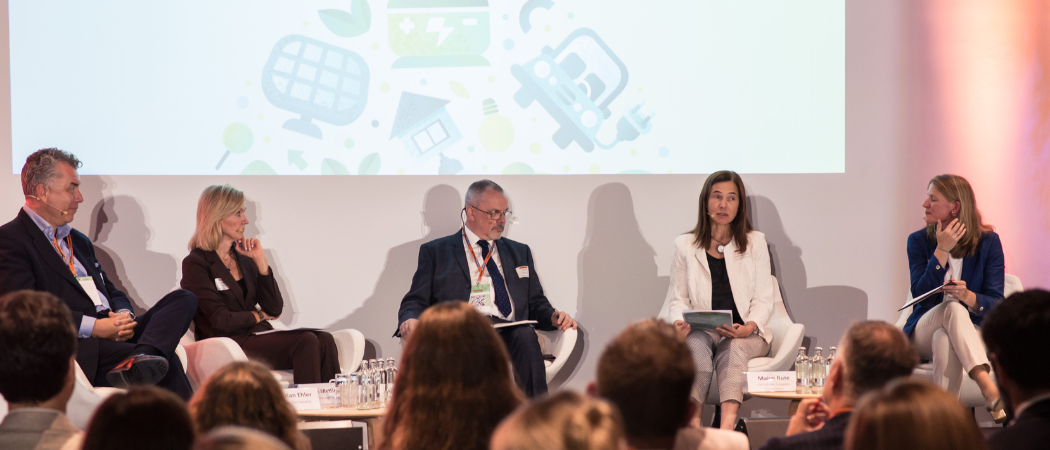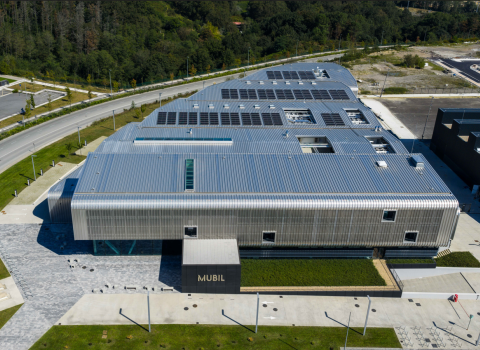Subsidies will not be enough to decarbononise industry. Instead the EU needs a scheme offering loan guarantees to de-risk and scale up green technologies

The opening plenary of Science|Business’ Green Deal & Climate days conference with, from left to right, Christian Ehler, Ann Mettler, Tim Green, Maive Rute and Maryline Fiaschi. Photo: Jeroen Vanhecke / Science|Business
Europe needs “a Juncker Plan on steroids” if it is to reach net-zero, Ann Mettler, vice president for Europe at Breakthrough Energy, told the Science|Business Green Deal & Climate days in Brussels on Monday, referencing the 2015 programme that used loan guarantees to secure financing for infrastructure and other projects that were otherwise too risky to invest in.
“Decarbonisation of our industry will cost a lot of money and no subsidies will achieve this. Thinking strategically about how we make Europe an attractive investment destination will be key,” Mettler said.
While world-leading clean technology companies exist in Europe, their big difficulty is in scaling, something which larger companies could help with. “We know that the cleantech frontier tends to be in start-ups, not in these big industrial players,” Mettler said. “That is why my proposal going forward is to think much more deeply about how we bring the big industry players that need to decarbonise together with the start-ups at the technology frontier.”
European Commission President Ursula von der Leyen claimed in her state of the union speech earlier this month that the European Green Deal is entering a new phase, where the focus is on industrial policy. But both Mettler and Christian Ehler MEP, rapporteur on the Net-Zero industry Act (NZIA), said that the “business case for decarbonisation” had not been made.
“We cannot regulate ourselves to net zero,” Mettler said. “What the Commission does between now and the next mandate is extremely decisive. When the President spoke of the next phase for the Green Deal, we need to take that very seriously, as she is finally addressing a lot of what has not worked.”
For Ehler, “The Green Deal was green but didn’t have a deal.” Part of the problem lies in the relationship between the EU, industry and member states. “When the heads of state were simply dropping the research budget at the last meeting before this term when we went from roughly €225 billion […] to something like €85 billion, we hit substantially the innovation agenda in Europe,” Ehler said.
He also believes the lack of a specific budget attached to the Net-Zero Industry Act, in contrast to the Inflation Reduction Act in the US, will limit its impact.
Ehler expressed particular concern that implementation is being favoured over the basic research that will be needed to fuel future progress. “I’m very much worried about the mid-2030s,” he said. “We could see in the 1990s and 2000s, if you don’t fund basic research and open research, you’re not going to have enough innovation in a 15, 20, or even 10-year perspective.”
As things stand, Ehler does not expect any additional funding for decarbonising, but said resources could be redirected from elsewhere. In his draft report on the NZIA submitted to the Committee on Industry, Research and Energy (ITRE) in June, he proposed member states use 25% of the EU Emissions Trading System (ETS) revenue for this purpose. “Member states get rich by the ETS, but it doesn’t go to innovation or back to industry,” he said.
System integration
Several panellists stressed the importance of building grids with the capabilities to manage power coming from disparate renewable sources.
“We have to build out a grid that’s able to accommodate in terms of its actual infrastructure all of these additional renewables, but also accommodate it in terms of the digitalisation that allows us to control it, and connect it to people,” said Tim Green, academic leader for sustainability at Imperial College London.
There is disagreement over the role nuclear power should play in the energy transition. Yves Desbazeille, director general of Nucleareurope, said more and more member states are coming out in favour of nuclear as a carbon-free energy source. He called for more support at a European level to build large reactors, and for research and standardisation of small modular reactors.
On the other hand, Ehler criticised the “blind optimism”, particularly in eastern Europe, that nuclear energy will solve the continent’s problems.
“Even in the nuclear countries like France, when we didn’t invest in the high temperature reactors in the 1980s and ‘90s, we lost the pace,” he said. “We need an energy mix - and nuclear will be part of it - but the amount of public investment needed for new nuclear in Europe will hamper renewables in a way I think is problematic.”
Permitting delays
Developing the technology is one thing, implementing it is another, and the sector has been held back over planning permissions. “It’s a scandal,” Mettler said. “Part of the reason our wind industry is on the verge of collapse is because of the slow permitting.”
Speeding up permits is a key aim of NZIA. Maive Rute, deputy director general of DG GROW, cited the recent case of an Estonian wind farm which took almost 13 years to get a permit, but she also pointed to regulatory incoherence as another barrier to green projects.
For example, projects which had been approved under the Important Projects of Common European Interest programme need further approvals. “It turns out than in order to get some money flowing, the same project will have to go again through scrutiny for the cohesion policy,” Rute said.
Mettler also called for better metrics to measure success, and said announcing targets for 2030 or 2040 is not enough. “If we think we’re leaders in clean hydrogen, we’re fooling ourselves. Only about 5% of the projects that have been announced have reached final investment decision - but only when you reach final investment decision is there a shovel in the ground.”
Hearts and minds
Alongside industry buy-in, it is necessary to build support for net-zero among the general population.
Ehler highlighted the importance of the creative industries in accompanying the energy transition, praising the concept of the New European Bauhaus. “Dystopias don’t work in society; we need a positive idea. If we look to wind, for example, the problem is there is no perception in the European citizen that a windmill in front of their house is a good idea,” he said.
Signe Ratso, deputy director general at DG RTD also stressed the importance of citizen engagement. “We also need to invest in not only the innovations related to technology, but also in social sciences and humanities in order to understand better what is driving us as people,” she said.





 A unique international forum for public research organisations and companies to connect their external engagement with strategic interests around their R&D system.
A unique international forum for public research organisations and companies to connect their external engagement with strategic interests around their R&D system.